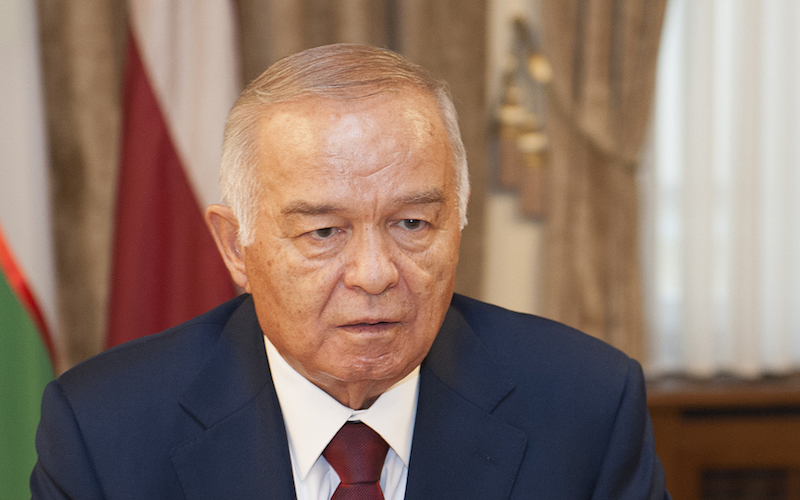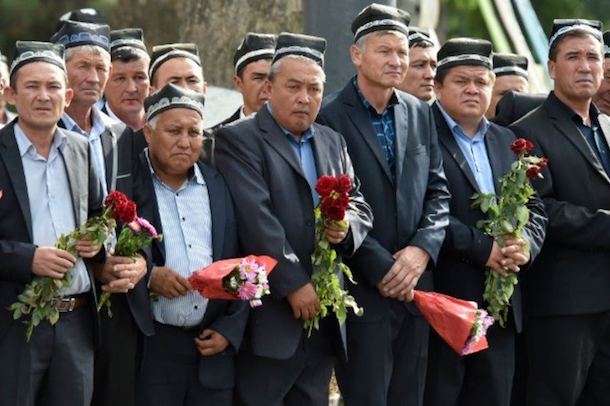
Karimov’s Wake: The Future of Uzbekistan
The sudden death of Uzbekistan‘s president, Islam Karimov, on September 2 of this year has left the nation with a succession dilemma as Karimov never designated an explicit heir to his political legacy. The unexpected interregnum has accorded the country with pronounced uncertainty concerning potential ethnic clashes, border conflicts, the possible rise of Islamic fundamentalism, and, perhaps most significantly, a conceivable succession crisis. Owing to the volatile political dynamics in Central Asia and Uzbekistan’s particular geopolitical significance, the current situation is of great concern to regional stability.
Currently, three men represent the most probable candidates for the Uzbek presidency: Prime Minister Shavkat Mirziyoyev, First Deputy Prime Minister and Finance Minister Rustam Azimov, and Chief of the National Security Service Rustam Inoyatov. The Uzbek constitution prescribes that, when a president is unable to exercise his power due to death or a lesser calamity, the head of the senate shall be entrusted with power until an election is held three months later. In this case, Nigmatulla Yuldashev, much less known and powerful than these others figures, has become the interim Uzbek president.
Unlike Yuldashev, Shavkat Mirziyoyev has become a well-known figure both in his home country and the international community. Born in 1957, Mirziyoyev has remained particularly faithful to Karimov’s policies and ideologies. Consequently, Karimov ensured that Mirziyoyev remained in office for an unusually long time during his presidency, entrusting him with many onerous yet important tasks.
The consensus is that, if elected, Mirziyoyev will carry on Karimov’s authoritarian, dictatorial style of leadership, leading to the rise of a new regime not unlike the one Karimov led for the past twenty-five years. Moreover, many have conjectured that Mirziyoyev is predisposed to strengthen ties with Russia due to a familial connection: his niece was married to Babur Usmanov, heir to Russian billionaire Alisher Usmanov, prior to his unexpected death in 2013.
The second candidate, Rustam Azimov, may, conversely, offer a leadership style that is influenced by Western concepts to a far greater extent. In contrast to the other two candidates, who have had no systematic exposure to Western ideologies, Azimov received his doctorate degree in Economics from Oxford University. As a result, his expertise regarding capitalism and his international background have rendered him conspicuously liberal in an environment that traditionally shuns such a philosophy.
The third candidate, Rustam Inoyatov, is already seventy-two years old, and has kept his life much more private, receiving little media coverage during his rise to power. Inoyatov, as chief of the National Security Service, has been leading arguably the most powerful institution in Uzbekistan for over twenty years. Analysts suspect that, notwithstanding his current influence over politics in Uzbekistan, Inoyatov’s age will make him less likely to vie for or secure the presidency. However, his position is still considered critical with regard to determining who will become the next president, even if he chooses not to attempt to fill such a role himself.

Due to the opaque nature of the Uzbek political system, ascertaining the dynamics of the inner circle of the country’s leadership and predicting the result of succession is a difficult process. As such, the European Council on Foreign Relations has suggested four potential leadership scenarios that may come to pass. In the first scenario, Inoyatov becomes president after declaring a state of emergency and seizing power. In the second scenario, the regional elites support and install Mirziyoyev as president. Third, under the constitution’s power transition mandate, the position is temporarily filled by Yuldashev until three months after Karimov’s death, leaving Uzbekistan particularly vulnerable to manipulation in the interregnum. The fourth possibility is that Inoyatov, described as a “kingmaker,” endorses Azimov to preserve the balance of political clans, leading to Azimov’s assumption of power.
Nevertheless, many analysts believe that Mirziyoyev is Karimov’s most likely successor. Notably, in the past five years, the Uzbek constitution has been revised numerous times; each draft has added increasing power to the prime minister’s position, meaning that Mirziyoyev has come to hold a significant degree of political influence.
Experts are also concerned with the manner by which such a change in leadership may occur. Many hope that this transition of power will be smooth and peaceful, as in the case of Turkmenistan following the death of Niyazov. In 2006, following the unexpected passing of then-dictator Saparmurat Niyazov, Deputy Prime Minister Gurbanguly Berdymukhamedov was declared president after a two-month period. During this lengthy interval, no violence occurred. Nevertheless, such peace is rare in times of political uncertainty; thus, it is to the benefit of both national and regional stability that the leadership in the capital of Tashkent reaches unanimity soon. The longer the delay, the less stable the country may become.
Central Asia has long been treated as a battleground between Russia and United States-led NATO politics. In the past, Karimov has cautiously kept a distance from Russia lest it fall prey to Russia’s Eurasian integration ambitions at the cost of national sovereignty. Currently, with Russia growing increasingly assertive in its role as the self-proclaimed leader of Central Asia and with China joining the game as a result of its One Belt One Road (OBOR) program, which aims at economically integrating Central Asia, Uzbekistan faces a staggering degree of external pressure.
On September 2, the day of Karimov’s death, Russian president Vladimir Putin personally visited Tashkent to pay his condolences to Karimov’s friends and family. Such an action represented a striking political move; in comparison, the United States merely sent a local diplomat to attend Karimov’s funeral. During the visit, Putin is said to have expressed his support for Mirziyoyev, the host of the event, and voiced his desire to further advance the relationship between Russia and Uzbekistan.
In response, Mirziyoyev “told Putin his visit ‘says a lot.’” Owing to Mirziyoyev’s pro-Russian propensity, it is likely that, if elected, Mirziyoyev will propel Uzbekistan further into Putin’s realm of influence rather than continuing its current multidirectional foreign policy, which seeks to achieve maximum benefit from relationships with both Russia and the United States. However, given that there are currently over two million Uzbek workers in Russia whose remittances account for a significant percentage of Uzbekistan’s GDP, Russia also possesses much economic leverage that the new Uzbek president cannot simply ignore.
Moreover, if he fails to achieve power, Mirziyoyev may request help from this powerful outsider. Russia has been modernizing its army since the Russo-Georgian War in 2008 in order to develop a rapid-reaction force able to swiftly intervene in neighboring countries. Some analysts note that, if Russia is displeased with the results of Uzbekistan’s presidential succession process, Moscow might attempt to further manipulate Uzbekistan’s domestic affairs by assisting separatists in Karakalpakstan, an autonomous region in western Uzbekistan. Russia has historically been heavy-handed when intervening in the politics of its peripheral countries, such as Georgia and the Ukraine, citing international law to justify unilateral actions. In the case of Uzbekistan, which, like Georgia and the Ukraine, maintains a considerable population of ethnic Russians, it is likely that Russia would justify such an intervention by rationalizing that it has a duty to protect native and ethnic Russians abroad.
Leading to further complication is the expansion of the Chinese OBOR program in Central Asia. As a means of gaining political leverage through the economic integration of OBOR, China may seek to further manipulate politics in the region. Uzbekistan is particularly fiscally reliant upon China, leaving the nation vulnerable to Chinese influence. Regardless of which candidate assumes the presidency, he certainly cannot dismiss China’s economic prowess and ambition.
The United States and its allies have been cooperating with Uzbekistan in their campaign against terrorism in Central Asia for decades. Although U.S. military presence drastically diminished in Uzbekistan after 2005 when Karimov requested that these troops vacate bases in the towns of Termez and Khanabad, the United States still holds significant interest in maintaining Uzbekistan’s stability. In particular, the U.S. seeks to strengthen the latter’s role in terms of countering terrorist groups in Central Asia and Afghanistan.
Russia, China, and the United States each shares an interest in maintaining Uzbek stability in order to avert future acts of terrorism and the further development of the regional narcotics trade. Such matters are particularly significant at present, as Uzbekistan currently lacks a secure administration able to manage such issues. Since Uzbekistan renounced its Collective Security Treaty Organization (CSTO) membership in 2012, and the Shanghai Cooperation Organization (SCO)—of which Uzbekistan is a member—remains notably indifferent to the domestic affairs of its member states, the safeguards needed to guarantee Uzbekistan’s transitional stability are clearly lacking.
Therefore, it is suggested by this author that the U.S. take the initiative to set up a temporary “Conflict Prevention Mechanism” jointly with Russia, China, and other countries in the region. Under such a framework, should the Uzbek security situation deteriorate as a result of ethnic tension, the resurgence of Islamic fundamentalism, border conflict, or factional competition, the U.S. will be able to cooperate and coordinate with Russia and China to pressure Tashkent to take particular measures toward increasing stability.
In the worst-case scenario of violence erupting during this difficult political climate, an apolitical “Responsibility to Protect” intervention under the aegis of the UN should be enacted to prevent mass civilian casualties. The common desire for regional stability shared by Russia, China, and the U.S. means that they will likely steer the UN Security Council, of which all three states are members, to set such a process in motion.

